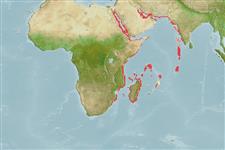Environment: milieu / climate zone / depth range / distribution range
पारिस्थितिकी
समुद्री प्रवाल-भित्ति संयुक्त; गहराई सीमा 1 - 8 m (Ref. 9710). Tropical
Western Indian Ocean: apparently endemic to the Red Sea.
आकार / वज़न / Age
Maturity: Lm ? range ? - ? cm
Max length : 25.0 cm TL पुल्लिंग / अलिंग; (Ref. 9710); common length : 15.0 cm TL पुल्लिंग / अलिंग; (Ref. 3507)
Found above sandy bottoms, around coral reefs and in shallow coastal waters. Young may form aggregations. Feeds on algae and small invertebrates. Sold fresh and whole in markets.
Life cycle and mating behavior
Maturities | पुनरुत्पत्ति | Spawnings | Egg(s) | Fecundities | लार्वा
Bauchot, M.-L. and M.M. Smith, 1984. Sparidae. In W. Fischer and G. Bianchi (eds.) FAO species identification sheets for fishery purposes. Western Indian Ocean (Fishing Area 51). volume 4. [var. pag.] FAO, Rome. (Ref. 3507)
IUCN Red List Status (Ref. 130435)
Threat to humans
Harmless
Human uses
मात्स्यिकी: व्यापारिक
साधन
Special reports
Download XML
इंटरनेट स्रोत
Estimates based on models
Preferred temperature (Ref.
123201): 24.8 - 29.2, mean 27.6 °C (based on 331 cells).
Phylogenetic diversity index (Ref.
82804): PD
50 = 0.5000 [Uniqueness, from 0.5 = low to 2.0 = high].
Bayesian length-weight: a=0.01230 (0.00574 - 0.02638), b=3.04 (2.87 - 3.21), in cm total length, based on LWR estimates for this Genus-body shape (Ref.
93245).
Trophic level (Ref.
69278): 2.7 ±0.25 se; based on food items.
लौटाव (Ref.
120179): माध्यम, न्यूनतम जनसंख्या दुगनी होने का समय 1.4 - 4.4 वर्ष। (Preliminary K or Fecundity.).
Fishing Vulnerability (Ref.
59153): Low vulnerability (15 of 100).
Nutrients (Ref.
124155): Calcium = 80.6 [38.8, 138.1] mg/100g; Iron = 0.713 [0.377, 1.302] mg/100g; Protein = 19.4 [18.2, 20.6] %; Omega3 = 0.117 [0.062, 0.226] g/100g; Selenium = 19.3 [10.2, 36.0] μg/100g; VitaminA = 93.7 [24.5, 312.8] μg/100g; Zinc = 1.67 [1.11, 2.36] mg/100g (wet weight);
